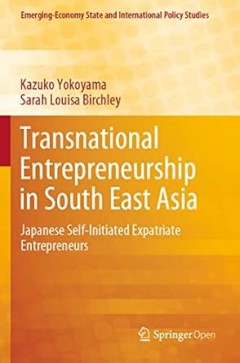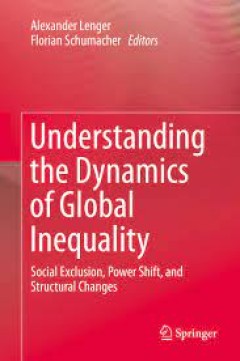Filter by

Sustainability Standards and Global Governance : Experiences of Emerging Econ…
This open access book focuses on the issue of sustainability standards from the perspective of both global governance frameworks and emerging economies. It stems from the recognition that the accelerated pace of economic globalization has generated production and consumption patterns that are generating sustainability concerns. Sustainability standards (and regulations) are increasingly being u…
- Edition
- 1
- ISBN/ISSN
- 9789811534737
- Collation
- XXVII, 224 hlm; ill., lamp.,
- Series Title
- -
- Call Number
- -

Deutsch-chinesische Studienangebote erfolgreich managen = Rahmenbedingungen u…
In diesem Open Access-Buch liefern Katja Kuhn und Patrick Fekete eine hilfreiche Unterstützung zur erfolgreichen Entwicklung und Realisierung deutsch-chinesischer Studienprogramme. Basierend auf einer detaillierten Beschreibung des chinesischen Bildungssystems sowie einer Analyse der wirtschaftlichen, politischen, kulturellen und sozialen Rahmenbedingungen werden die wesentlichen Züge sowie E…
- Edition
- 1
- ISBN/ISSN
- 9783658235345
- Collation
- XVI, 95 ill; lamp
- Series Title
- -
- Call Number
- -

The Transformation of the Liberal International Order
This open access book aims to emphasize the potential for Japan, Europe and Indo-Pacific countries including the US to respond to shared domestic and international challenges on finding joint ways to uphold and develop the liberal international order (LIO) in the Asian Pacific region and the world. It explores how these countries and the region (the EU) can work together to promote solidarity a…
- Edition
- -
- ISBN/ISSN
- 978-981-99-4729-4
- Collation
- XII, 132
- Series Title
- -
- Call Number
- -

Global Business Strategy : Multinational Corporations Venturing into Emerging…
This book presents theories and case studies for corporations in developed nations, including Japan, for designing strategies to maximize opportunities and minimize threats in business expansion into developing nations. The case studies featured here focus on Asia, including China and India, and use examples of Japanese manufacturers. Five case studies are provided, including Hitachi Construct…
- Edition
- -
- ISBN/ISSN
- 978-4-431-55468-4
- Collation
- XVII, 259
- Series Title
- Springer Texts in Business and Economics (STBE)
- Call Number
- 650 MOT g

Transnational Entrepreneurship in South East Asia
Professor Yokoyama is the Dean of the Graduate School of Business Administration, Toyo Gakuen University, Tokyo, Japan, where she supervises research in the field of human resource management in Japanese companies by drawing comparisons between Japanese-style employment management and the merit-based systems. Her recent research is concerned with Japanese self-initiated expatriate entrepreneurs…
- Edition
- 1
- ISBN/ISSN
- 9789813292529
- Collation
- XXI, 220, hlm,: ill, lamp;
- Series Title
- -
- Call Number
- -

Brazilian Entrepreneurship
Brazil is a large country in terms of geographic land mass and population size. It’s position in Latin America means that it contributes to much of the economic development within this area. Despite the importance of Brazil in the global economy, not much research has been highlighted about entrepreneurship in the country. This book aims to change this by focusing on Brazil in terms of entrep…
- Edition
- 1
- ISBN/ISSN
- 978-3-031-09392-0
- Collation
- Industrial
- Series Title
- -
- Call Number
- 338

Understanding the Dynamics of Global Inequality Social Exclusion, Power Shif…
Despite the fact that the globalization process tends to reinforce existing inequality structures and generate new areas of inequality on multiple levels, systematic analyses on this very important field remain scarce. Hence, this book approaches the complex question of inequality not only from different regional perspectives, covering Africa, Asia, Europe, Latin and Northern America, but also …
- Edition
- -
- ISBN/ISSN
- 978-3-662-44766-6
- Collation
- -
- Series Title
- -
- Call Number
- -

Assessing China's Naval Power: Technological Innovation, Economic Constraints…
This book analyzes the rise of China’s naval power and its possible strategic consequences from a wide variety of perspectives – technological, economic, and geostrategic – while employing a historical-comparative approach throughout. Since naval development requires huge financial resources and mostly takes place within the context of transnational industrial partnerships, this study als…
- Edition
- Ed. 1
- ISBN/ISSN
- 978-3-662-47127-2
- Collation
- XX, 318
- Series Title
- Global Power Shift
- Call Number
- 337 KIR a

The Sugarcane Complex in Brazil The Role of Innovation in a Dynamic Sector o…
This book offers an in-depth analysis of the Brazilian sugarcane complex with a special focus on technological advances that promote sustainable development. It first examines the question why sugarcane-based ethanol from Brazil is considered a superior alternative to fossil fuel compared to other biofuels produced on an industrial scale and subsequently analyzes the most dynamic areas within t…
- Edition
- -
- ISBN/ISSN
- 978-3-319-16583-7
- Collation
- -
- Series Title
- -
- Call Number
- -
 Computer Science, Information & General Works
Computer Science, Information & General Works  Philosophy & Psychology
Philosophy & Psychology  Religion
Religion  Social Sciences
Social Sciences  Language
Language  Pure Science
Pure Science  Applied Sciences
Applied Sciences  Art & Recreation
Art & Recreation  Literature
Literature  History & Geography
History & Geography